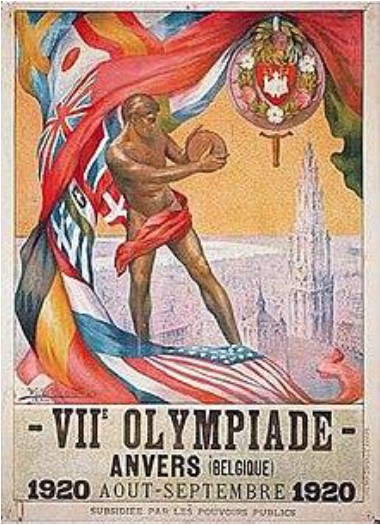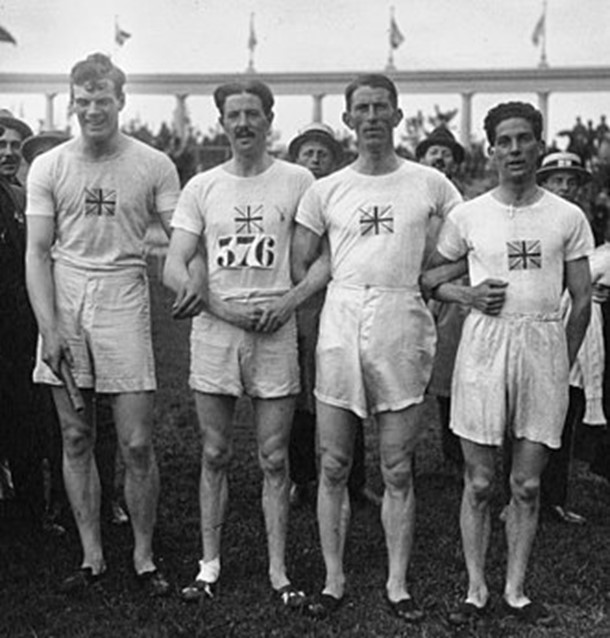
News
Welshmen to the fore at the Olympics a Century Ago
15/10/2020 00:00, In Blog /
That great day in Antwerp 100 years ago Last Month
recalled by Clive Williams
Only four Welsh athletes have won Olympic gold medals in the traditional Olympic track and field events and a century ago, two of these - Cecil Griffiths and Jack Ainsworth-Davis - won their medals as part of Britain’s winning 4 x 400m team in the 1920 Antwerp Olympics.
Lynn Davies the 1964 long jump champion and 1912 sprint relay gold medallist David Jacobs are the only others to have achieved the ultimate feat. Lynn remains Wales’ only individual Olympic gold medallist 56 years on from his historic win in the Tokyo rain.
Aberystwyth-born Ainsworth-Davis also finished 5th in the individual 400m final in Antwerp in an estimated 50.6 secs after getting his place in the event because the originally selected Griffiths was taken ill just before the heats. British-based South African Bevil Rudd won in 49.6 secs - a time Neath-born Griffiths was easily capable of achieving. Especially when you consider his performance in the following year’s Welsh Championships where he won the 440 yards in a Welsh record 49.8 secs - that’s equivalent to 49.5 for 400m - on a bumpy 330 yards grass track at Barry Cricket ground.
Griffiths is certainly one of the all-time great of Welsh athletics. Remarkably his Welsh 440 yards record stood for almost 31 years. He won ten Welsh titles in all, including five successive 440 yards titles between 1920 and 1924, and four 880 yards wins in 1922-24 and again in 1927. To underline his versatility, he also took the 220 yards title in 1921 on the same day that he won the 440 yards in that Welsh record of 49.8. His wins in 1922 and 1923 came on the hallowed turf of the old Cardiff Arms Park.
Ainsworth Davis, a Cambridge University student, of whom very little is known took his place in the individual event at very short notice due to Griffiths’ illness, so a fit Griffiths could have easily challenged for the gold. Fortunately Griffiths recovered sufficiently to run the first leg of the relay in which he brought the British squad home in the lead in 50.6 secs. Ainsworth-Davis ran an estimated time of 50.0 secs in the 400m heats to qualify for the final, which was the fastest time recorded by a Welshman at the time. The other team members in Antwerp were Guy Butler and Robert Lindsay.
Griffiths, whose son John died in Neath only three years ago - he has a Blue Plaque on the house he was born in Neath – really was an extraordinary athlete having been the UK 880 yards record holder (1:54.6 secs), and winner of two AAA (effectively UK) 880 yards titles in 1923 and 1925. During the course of his career, he set three British best times at 880 yards and 1,000 metres. He was a finalist at the AAA championships at either 440 yards or 880 yards for an almost unbelievable nine successive years. This is an achievement that very few athletes have accomplished and he also finished third over 440 yards three times between 1919 and 1921. In 1919 he was only 19 and still remains at 20 years of age one of Britain’s youngest athletics Olympic gold medal winners.
There were no elaborate celebrations in those days for returning Olympic gold medallists. He returned to the UK immediately following his return from Antwerp and the next day was back in work.

Poster for 1920 Antwerp Olympic Games.
We all remember Eric Liddell of Chariots of Fire fame who won the 400m in the 1924 Paris Olympics after refusing to run in the 100m as the heats were due to be held on a Sunday. But Cecil Griffiths was one of Britain’s top 400m runners at the time and should have been in Paris to challenge for the individual gold and try to retain his Olympic 4 x 400 title as a member of the British squad.
However, it was discovered by the British authorities at the time of the team selection that he had unwittingly accepted a small cash prize seven years earlier as a 17 year-old whilst still living in Neath. Although reinstated by the AAA for home competition, he was banned from international competition by the then world-wide governing body. Therefore he could not be selected for Paris, although the AAA wanted to select him. At the time there was a clear distinction between amateur and professional athletes, and due to the rules then the Olympics were closed to professionals. It’s only since the 1988 Seoul Olympics that professionals have been allowed to compete.
Think about it: if Cecil had been selected to run in Paris in 1924, Eric Liddell may not have won the 400m……if that had have happened there would not have been a “Chariots of Fire” movie and no academy awards! But realistically, he was certainly capable of reaching the final and possibly winning a medal. The silver was won in 48.4 secs and Guy Butler, his gold medal teammate from Antwerp took the bronze in 48.6.
Sadly, Cecil Griffiths died in 1945 of heart failure at the tragically young age of 45 on Golder’s Green Tube Station leaving a widow and two sons. He is the very first person to be inducted into the Welsh Athletics Hall of Fame on a posthumous basis – such is the stature of this athlete. He truly is one of the all-time greats of Welsh athletics.
Ainsworth-Davis became an eminent doctor and urological surgeon and died in Somerset in 1976 aged 80. Compared to Griffith’s performance in the AAA championships, Ainsworth-Davis’ achievements are quite modest. In his only recorded appearance in the AAA championships he finished 4th in the 440 yards the year after his Olympic gold, being beaten by a yard for third by Griffiths. Robert Lindsay, his fellow relay gold medallist won the race defeating the Olympic champion, Bevil Rudd.
Note: I’m grateful for the assistance received from John Hanna and the late Ian Buchanan in the production of this article.

Left to Right: Guy Butler, Jack Ainsworth-Davis, Robert Lindsay and Cecil Griffiths immediately after their 4 x 400 Olympic victory. Note that Butler still has the baton in his hand.